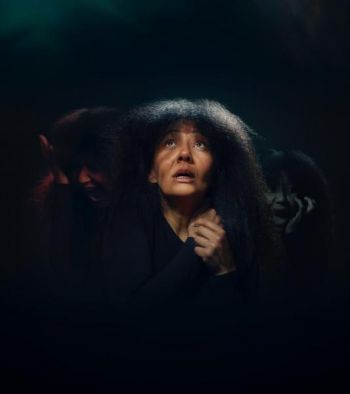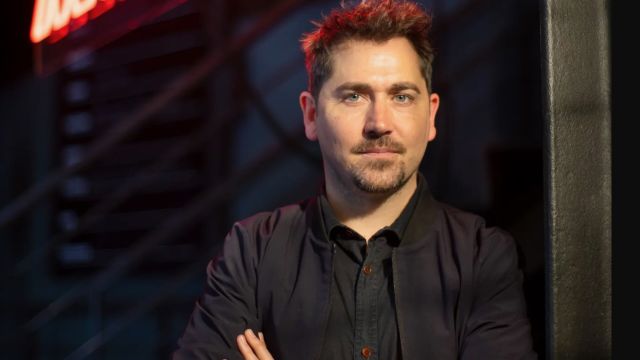Impossible Theatre
Retiring Malthouse Theatre Artistic Director Matthew Lutton has set up a wildly ambitious adaptation of The Birds in his final year with the company. At the Drama Victoria conference, he explained why he’s attracted to directing works that appear impossible to stage. David Spicer reports.
Matthew Lutton is leaving the Malthouse Theatre to take up Artistic Directorship of the Adelaide Festival at a time when he believes that every bit of theatre is unstable, and the industry is in crisis.
“People don’t have as much money for tickets, the costs of making the shows are up, the funding to put on the shows is static or going down and a lot of philanthropy has gone. There is (also) a massive good but complicated push to see culturally diverse artists on stage. This means we are seeing artists training on stage. But this is difficult for audiences because they don’t want to see people being trained but at the top of their craft,” he said.
Lutton noted that whilst in the past one of these factors may have been at play, it’s hard to cope with them all at once. In the current environment he says audiences are more choosey and are flocking to well-known subjects.
 In 2025 he’s directing an adaptation of The Birds – famously filmed by Alfred Hitchcock, based on the story of Daphne du Maurier.
In 2025 he’s directing an adaptation of The Birds – famously filmed by Alfred Hitchcock, based on the story of Daphne du Maurier.
The theme for his lecture at the Drama Victoria conference was harnessing the wildly creative artistry of adaptations. During his nine-year tenure at the Melbourne’s Malthouse Theatre, he’s done plenty of them.
“I am attracted to texts that are porous - either so large, so you have to pick points to focus on so there is room for interpretation, or there is a metaphor at play, such as the rock and how time works, or what do the birds mean?
“If the text is perfect, it is not appropriate for a stage interpretation; if every character and line is necessary, I don’t want to touch it.
“Every adaptation I’ve done contains something in the material that has an impossible theatrical problem. Like the rock in Picnic in Hanging Rock, like the birds in The Birds with thousands and thousands of birds. That stimulates a great theatrical conservation about how to work it out.”
For the season staged at Malthouse, he solved the impossible problem of the rock by leaving it out and leaving it to the audience’s imagination.
“You need to know that audiences have images in their heads, and I don’t need to duplicate that on stage.
“In Hanging Rock people complained there was no rock and they were disappointed. I thought, would they really be satisfied by a ten metre polystyrene replica of a rock?”
In The Birds, adapted by Louise Fox, the creative team plan to simulate the attack by feathered friends through lighting.
The spooky story starts with the weather changing for no reason and the birds behaving strangely. They get into a family’s home and start attacking them. When the house is boarded up, the birds start suicide bombing. The next day the family has survived but their neighbours are dead. Only people have been killed. No other creatures are affected.
And what does Lutton think the birds mean? He said the metaphor at play in the original story was the looming fear of World War 2, the threat from Russia and conspiracy theories about foreigners.
His production will touch (but not too much) on the looming threat of climate change.
“I don’t want to underline that. I am stripping out lines that are too much about climate change. It is also about nihilism and other social structures.”
The adaptations which he has directed typically have an 18-month lead time that starts with a blank piece of paper.
Lutton described the practical first steps to begin the writing process. They are the size of the cast, the devices to denote the passing of time and what he called the theatrical grammar of the piece.
“Sometimes it is a practical thing. This show might have five people in the cast because that’s what we can afford. For The Birds one actor is playing every character, so therefore, the world is more psychological, and the birds are like a dream talking through her story.
Next, he discussed with the writer where the piece will be divided between dialogue, monologues and parts where there is no dialogue – filled with a soundscape or imagery.
Sometimes he uses an excel spreadsheet to make sure there is variety in the form between scenes.
Having a clear plan for how the play works with time is another priority.
“They are not set in 60 minutes of real time. If people say they are confused by a play it is often because they are confused by time. They might say, I thought this was a day later?”
He described two approaches to make it clear to audiences – “jump cut” or to “pass the baton” with a narrator.
In Picnic at Hanging Rock, Wright used the jump cut approach, which allowed him to drop chapters in the book which they considered boring. In that case, boys’ scenes were cut.
“The stage went black and there was a title card (describing the time and place of the next scene). That become a metaphor for going into a black hole – of time collapsing.”
Each of the adaptations has what he described as a unique poetic lexicon. In Picnic at Hanging Rock, the various locations/flora/fauna were labelled by their scientific name and if they had one the indigenous word for the same.
After nine years at the helm of Malthouse the winds of change have arrived, with Lutton announcing his departure from the company.
“It has been a spectacular honour to serve as Artistic Director of Malthouse Theatre. I am immensely proud of what we have achieved.
“My own journey now turns toward pursuing new creative ventures in international theatre and opera.”
The company lauded his commitment to artistic excellence, collaborations with international theatre giants in the UK and the sellout success of his immersive theatre, production Because the Night.
Not everything is always a success. Lutton noted ruefully that sometimes artistic directors make mistakes when they don’t communicate properly to audiences what a production is about.
“Someone might be sitting there thinking this is the greatest work I have ever seen whilst the person next to them thinks ‘what is this shit?’.”
The Birds. May 16 – June 7. Malthouse Theatre.
Subscribe to our E-Newsletter, buy our latest print edition or find a Performing Arts book at Book Nook.

